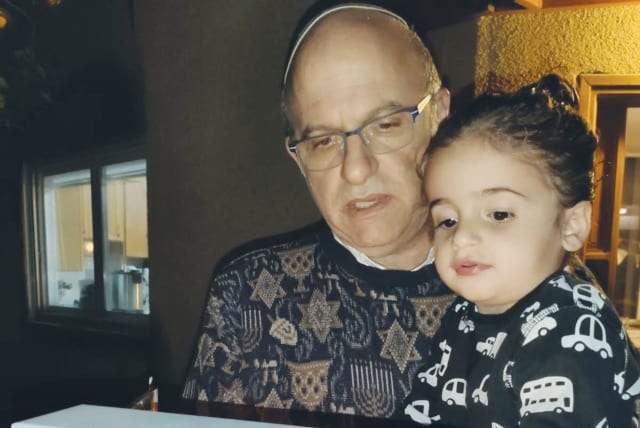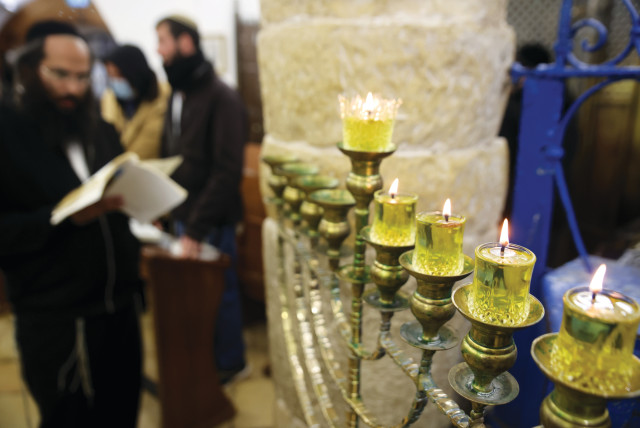The Hanukkah dilemma of 2023 - opinion

Embracing the House of Shammai’s custom.
This year, I was tempted to light the Hanukkah candles in the opposite direction from what I’ve traditionally done in previous years, aligning with the custom of the House of Shammai (Beit Shammai) instead of lighting based on the commonly observed order, a custom of the House of Hillel (Beit Hillel). Shammai’s followers would start with all eight candles being lit and then decrease daily, lighting one on the final night. Hillel’s custom, which most Jews follow to this day, begins with one, progressively adding candles, and culminating with eight candles on the final night, I contemplate following the custom of the House of Shammai this year, not with the desire to separate from tradition, but rather as an act of solidarity. Allow me to explain.
Ironically, against the story of the original Hanukkah, the insightful words of the ancient Greek philosopher, Plato, echo in my mind at this time: “Ignorance, the root and stem of all evil.” How is that the case, and why did Plato use two terms – both “root” and “stem” – to describe evil?
Today’s world is filled with evildoers and their supporters. I would suggest therefore that the terms “root” and “stem” represent each of those segments. The doers of evil are the “root” – through their ignorance and hatred, they choose to bring darkness into the world, to seek destruction with no reverence for the lives they might end or damage. For them, their evil is justified.
Projecting themselves as victims, they build their case and persuade the ignorant masses to join them in their fight, to take up their cause against their powerful oppressors. Those masses, the “stems” of evil that spread throughout the world, spread lies that have been disguised as truths, lies that they, the ignorant, have been duped into not only believing but also mindlessly promulgating.
The reason this thought echoes so profoundly for me at this time is because Hanukkah celebrates the triumph of good over evil, of light over darkness, and of knowledge over ignorance.
A Talmudic teaching on Hanukkah
The Talmud teaches that when it came time to celebrate the victory of Hanukkah – the war fought by a small force of good against the period’s mightiest global force, to reestablish the Jewish commonwealth and renew the permissibility of Jewish practice – one of the first things the Maccabees did was to reenter the ancient Temple and rekindle the menorah, the seven-branched candelabra. Lacking enough of the needed pure olive oil to fuel the it for more than a day, much less the eight it would take to press and ship new oil in, another miracle was performed for them that kept the candelabra fueled until the new oil arrived.
In commemoration of that historic victory, the rabbis eventually decided that candles would be annually lit in every Jewish home, for eight days. However, the two major schools of study in the first century, the House of Shammai and the House of Hillel, disagreed on the process.
Rabbi Shlomo Zevin (1886-1978), a renowned Zionist leader and author who was awarded the 1959 Israel Prize for Torah Literature, illuminated the dichotomy between these perspectives. He elucidated the fundamental contrast: fire versus light – the essence behind the candles’ symbolism. For the House of Shammai, the flames represented the fire of war essential to vanquishing prevailing evil, fading as darkness receded, culminating in just one candle, symbolizing the ultimate defeat of our enemies.
Conversely, the House of Hillel viewed the candles as symbols of light, embodying knowledge, wisdom, and understanding. Their Hanukkah celebration emphasized the valor of knowledge in combating evil, urging moral clarity, study, and enlightenment. It emphasized being a guiding light for their nation and the world, warning against the insidious spread of confusion between good and evil.
Today, Rabbi Zevin’s insights are as pertinent as ever. Israel must combat the “roots” of evil through fire, for its own survival and for the sake of the future of the global community. Simultaneously, global Jewry must intensify its battle against the “stems of evil” through educational efforts, fostering knowledge and clarity – fostering light – in a bewildered and confused world.
Just as Hanukkah lights radiate from our homes outward, so too Jewish education should emanate from Jewish homes outward, to the whole world. Adults, not just children, must actively pursue knowledge and understanding of our history, and be prepared to share it with others as together we shoulder the Jewish mission.
The writer, a rabbi and EdD, is the international director of the Melton School of Adult Jewish Learning.
Jerusalem Post Store
`; document.getElementById("linkPremium").innerHTML = cont; var divWithLink = document.getElementById("premium-link"); if (divWithLink !== null && divWithLink !== 'undefined') { divWithLink.style.border = "solid 1px #cb0f3e"; divWithLink.style.textAlign = "center"; divWithLink.style.marginBottom = "15px"; divWithLink.style.marginTop = "15px"; divWithLink.style.width = "100%"; divWithLink.style.backgroundColor = "#122952"; divWithLink.style.color = "#ffffff"; divWithLink.style.lineHeight = "1.5"; } } (function (v, i) { });

